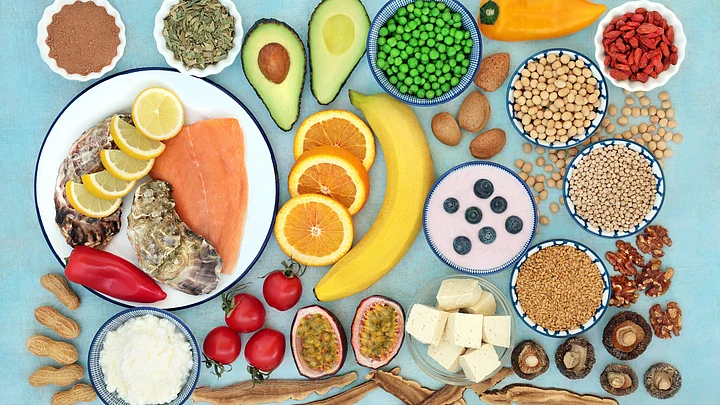Pause and give some thought to your nerves.
Yes, they are an important system, yet not given much care until of course they begin to malfunction. Then all hell breaks loose. It’s time to change that. Our nervous system is our body’s command centre.
Originating from the brain, it controls our movements, thoughts and automatic responses to the world around us.
It also controls other body systems like digestion, breathing and many more. It needs care and a focused diet to keep working correctly, and stay away from harm.
Some nutrients are particularly important to keep our nerves working fine. Make sure you include enough of the below-mentioned 7 nutrients in your daily diet.
Magnesium
Why Do We Need?
Magnesium is very important for the nervous system; in fact, our nerves simply can’t function without it.
It plays an important role in nerve transmission and neuromuscular conduction, and also has a protective role against neuronal cell death that leads to multiple neurological disorders.
Also, it boosts nerve repair by inhibiting inflammation.
How To Increase Your Magnesium Intake
We need about 400 mg daily. Best sources of Magnesium are dark leafy greens, especially spinach (Popeye apparently knew this), most nuts, particularly almonds, walnuts, cashews and peanuts, seeds, especially pumpkin and sunflower seeds, fish (mackerel, salmon, halibut), beans, whole grains (refining removes most of the magnesium, so that white bread you eat every morning has precious little of this precious mineral), avocados, yogurt, bananas, dried fruit, eggplant, and unsweetened cocoa.
So basically a day’s ‘get enough magnesium’ plan will look something like this:
spinach 250 gm (200 mg) or mackerel fish 250 gm (200 mg)
1 tbsp, about 10 gm pumpkin seeds (60 mg)
2 cups yogurt (100 mg)
10 almonds (30 mg) and 1 banana (30 mg)
Now that's doable, isn't it!
Protein
Why Do We Need?
We need protein for multiple functions in the body: for building muscle mass, gaining strength, keeping our metabolism on track, performing day-to-day activities, and exercising.
To top that, every body part is made up of protein, including our nerves, that is why it is needed for maintenance, upkeep, and regeneration of all our nerves too. Basically, we need enough protein to maintain a healthy, nervous system.
Here's How To Increase Your Protein Intake
Evenly spread the protein intake through the day across breakfast, lunch and dinner as this stimulates muscle protein synthesis (MPS) more effectively than eating the majority of daily protein at any one meal.
Try to include one good protein source in every meal of the day.
Eat more of the complete protein sources (that give all amino acids) like meats, dairy and eggs.
Include grains with higher amount of proteins like quinoa, buckwheat and amaranth (complete protein), oats, also deliver much more protein than the regular staples like rice and wheat.
Include mixed nuts and seeds in your diet.
Focus on lentils and beans. At 15-18 grams of protein per cooked cup (240 ml), lentils are a great source of protein.
Eat soya - delivers complete protein
Eat vegetables that give higher protein. 250 gm kale gives 10 gms 250 gms of peas, broccoli and spinach give 7 grams. 250 gm Potato, cauliflower, okra, avocado, mushrooms, and French beans give 5 grams, and beetroot gives 4 gms.
Sodium, Potassium and Calcium
Why Is it Important?
Both sodium and potassium are equally important. Your nerves send signals from the brain to the rest of your body.
If you do not have enough sodium or potassium in your diet, the cells have a more difficult time with this process.
Similarly, calcium is needed to help regulate the electrical impulses generated and transmitted by the nerves.
How To Increase Your Sodium, Potassium and Calcium Intake
Sodium deficiency is not usually a problem for most people because we can get it from salt we eat.
Potassium deficiency is more common, and usually it surfaces as muscular cramps and twitching, fatigue, muscular weakness, poor reflexes, irregular heartbeat and fragile bones.
It's easy to get all the potassium you need if you eat "five-a-day" - that's five servings of fruits and vegetables each day.
Banana packs a lot of potassium and so does potatoes.
Other excellent sources include mushrooms, spinach, broccoli, eggplant tomatoes, parsley, cucumber, strawberries, avocado, apricot, pomegranates, orange juice, cauliflower and cabbage.
Milk, leafy greens, eggs, sesame seeds and figs are rich sources of calcium, so include those in your diet too.
Vitamin B12
Why Is It Important?
Vitamin B12 is also essential for maintaining a healthy nervous system and blood, that is why numbness and a "pins and needles" sensation in the feet, legs or fingers also often results when the nerve gets damaged triggered by chronic low oxygen levels in cells due to low B12 levels.
Similarly, feeling dizzy when getting up suddenly or walking up the stairs too could be directly due to low levels of this vitamin in the body.
B-12 actually helps produce myelin, which is a protective coating that shields the nerves and helps them transmit sensations. That is why its deficiency may lead to not enough myelin to coat the nerves.
How To Increase Your Vitamin B12 Intake
Include vitamin B12 rich foods (dairy products, almonds, salmon, chicken, eggs, mackerel, tofu, mushrooms, and tuna) in the diet or opt for supplementation.
Folate another B vitamin is needed to protect the nerves from chemicals that can cause damage. Get this vitamin from spinach, pomegranates and beets.
Omega 3
Why Is It Important?
Omega-3 fatty acids could play an important role in preventing damage to nerves, and may help them to regenerate when damage does occur and can help speed up recovery.
In addition, our brain actually uses omega-3s to build brain and nerve cells, so its deficiency could be very detrimental.
How To Increase Your Omega 3 Intake
Fatty fish are the best source of this important nutrient. But vegetarians can get it from flaxseeds and walnuts.

